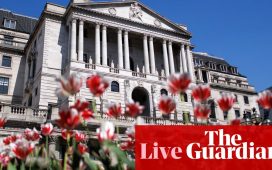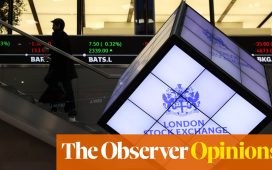FTSE 100 on track for best day of 2023
Britain’s blue-chip share index is on track for its best day of the year, as the fall in UK inflation in June boosts confidence in the City.
The FTSE 100 index is now up 151 points, or 2%, at 7606 points – a one-month high.
That would be its best day since last October.
Hopes that UK interest rates will peak below 6% are spurring a strong rally in housebuilders, with Persimmon (+9.5%), Taylor Wimpey (+6.6%) and Barratt Development (+6.5%) in the top risers.
🇬🇧 UK REAL ESTATE INDEX UP 5.2%, SET FOR BIGGEST ONE-DAY JUMP SINCE FEBRUARY 📈
🇬🇧 UK HOMEBUILDERS INDEX SET FOR BIGGEST ONE-DAY GAIN SINCE NOVEMBER 2008, LAST UP 6.6% 📈
— FMN – FastMarketNews (@FastMarketNews) July 19, 2023
The money markets now believe the Bank of England is more likely to raise interest rates by a quarter-point next month, rather than by half a point as previously expected.
Looking further ahead, rates are expected to peak around 5.75%, rather than over 6%.
A whole repricing of UK interest rate expectations takes place as short-end Gilts rally following soft UK CPI figures. Markets now pricing +0.28% increase on Aug 3rd vs +0.44% yesterday. Terminal rate now seen reaching 5.8% compared to an expectation of nearer to 6.25% yesterday.
— Saxo UK (@SaxoUK) July 19, 2023
UK government bonds continue to rally (see earlier post), pulling down the yields used to price fixed-rate mortgages.
The drop in UK inflation to 7.9%, from 8.7%, has also sparked a strong rally in the UK-focused FTSE 250 index.
The FTSE 250, which contains smaller companies, is up 3.59%, its strongest day since February.
Investors are hoping that UK inflation has peaked, and will fall back towards levels seen in other major economies.
Danni Hewson, head of financial analysis at AJ Bell, says:
A further decline in inflation for July could really get the ball rolling for UK equities and lift them out of the mud. While the FTSE 250 is in party mode today, the rally only puts the index back to levels last seen in June.
“Housebuilders had been heavily sold off due to fears a sharp rise in interest rates would destabilise the housing market. While that’s certainly in motion, with plenty of people struggling with higher mortgage rates and a slowdown in property transactions, the valuations of housebuilders were effectively pricing in a deep rut.
Today’s inflation news has spurred investors with an appetite for risk to go fishing for bargains in the space in the hope that property market won’t experience a severe collapse.”
Key events
The pound is losing more ground against the US dollar as the afternoon moves along.
Sterling is now down 1.5 cents, or 1.2%, at $1.2883, as traders reassess how high UK interest rates will need to go to bring down inflation.
Britain’s banks too slow in passing higher interest rates to savers, says watchdog
UK financial regulators have told MPs that Britain’s banks are not passing on higher interest rates to savers fast enough.
Financial Conduct Authority chief executive Nikhil Rathi told parliament’s Treasury Select Committee that:
“The pace has simply not been fast enough,”
Challenged about some of the “poor” rates available on easy access accounts from major banks, Rathi said there is a “long-standing” position that customers get the best rates from the building societies.
Digital and challenger banks tend to be close behind, while high street banks offer the poorest rates, he said.
The FCA isn’t a price regulator, Rathi points out.
But it does expect savings rates to improve as a new duty forcing banks to provide good outcomes for consumers comes into force.
FTSE 100 on track for best day of 2023
Britain’s blue-chip share index is on track for its best day of the year, as the fall in UK inflation in June boosts confidence in the City.
The FTSE 100 index is now up 151 points, or 2%, at 7606 points – a one-month high.
That would be its best day since last October.
Hopes that UK interest rates will peak below 6% are spurring a strong rally in housebuilders, with Persimmon (+9.5%), Taylor Wimpey (+6.6%) and Barratt Development (+6.5%) in the top risers.
🇬🇧 UK REAL ESTATE INDEX UP 5.2%, SET FOR BIGGEST ONE-DAY JUMP SINCE FEBRUARY 📈
🇬🇧 UK HOMEBUILDERS INDEX SET FOR BIGGEST ONE-DAY GAIN SINCE NOVEMBER 2008, LAST UP 6.6% 📈
— FMN – FastMarketNews (@FastMarketNews) July 19, 2023
The money markets now believe the Bank of England is more likely to raise interest rates by a quarter-point next month, rather than by half a point as previously expected.
Looking further ahead, rates are expected to peak around 5.75%, rather than over 6%.
A whole repricing of UK interest rate expectations takes place as short-end Gilts rally following soft UK CPI figures. Markets now pricing +0.28% increase on Aug 3rd vs +0.44% yesterday. Terminal rate now seen reaching 5.8% compared to an expectation of nearer to 6.25% yesterday.
— Saxo UK (@SaxoUK) July 19, 2023
UK government bonds continue to rally (see earlier post), pulling down the yields used to price fixed-rate mortgages.
The drop in UK inflation to 7.9%, from 8.7%, has also sparked a strong rally in the UK-focused FTSE 250 index.
The FTSE 250, which contains smaller companies, is up 3.59%, its strongest day since February.
Investors are hoping that UK inflation has peaked, and will fall back towards levels seen in other major economies.
Danni Hewson, head of financial analysis at AJ Bell, says:
A further decline in inflation for July could really get the ball rolling for UK equities and lift them out of the mud. While the FTSE 250 is in party mode today, the rally only puts the index back to levels last seen in June.
“Housebuilders had been heavily sold off due to fears a sharp rise in interest rates would destabilise the housing market. While that’s certainly in motion, with plenty of people struggling with higher mortgage rates and a slowdown in property transactions, the valuations of housebuilders were effectively pricing in a deep rut.
Today’s inflation news has spurred investors with an appetite for risk to go fishing for bargains in the space in the hope that property market won’t experience a severe collapse.”
Larry Elliott: Rishi Sunak’s inflation targets no longer seem so hard to hit

Larry Elliott
Rishi Sunak and Jeremy Hunt will be breathing a big sigh of relief at the latest inflation figures, our economics editor Larry Elliott writes.
On the face of it, there is not a great deal to crow about. At 7.9%, the annual increase in the cost of living as measured by the consumer prices index is still running at four times the government’s 2% target.
But for the first time in a while, inflation has come in below the level expected by the financial markets. That goes for headline inflation and core inflation, the measure that excludes volatile items such as food and fuel, and which came down from 7.1% to 6.9% in June. The City had thought headline inflation would drop to 8.2% and that core would remain unchanged.
Inflation in the service sector also fell last month, from 7.4% to 7.2%. That is significant not only since services make up about four-fifths of the economy’s total output but also because what is happening to the price of services is seen by economists as a guide to inflation generated by the domestic economy.
Macquarie takes further control of Britain’s gas network
Australia’s Macquarie Group has tightened its grip on the UK’s energy sector today.
National Grid has sold a further 20% stake in its UK gas transmission and metering business to a consortium led by Macquarie Asset Management.
The sale is on the equivalent financial terms to the previous sale of 60% of National Gas to the Macquarie-led group, which was completed in January 2023
Martin Bradley, European head of infrastructure real assets at Macquarie, said the deal “underlines our commitment to National Gas and the critical role it plays in the UK’s energy system”.
Bradley added that Macquarie aspires to acquire the rest of National Gas “in due course”.
National Grid plans to use the £700m proceeds for general corporate purposes including repaying its debt.
Macquarie already owns a string of UK infrastructure assets including Southern Water, and in May it posted record profits after a boom in its commodities trading division. No wonder it’s been dubbed the “millionaire’s factory”, thanks to its bumper payouts to senior staff.
Macquarie’s has deep ties to the UK, having been created as a subsidiary to the British merchant bank Hill Samuel & Co in 1969.
It has faced criticism over its ownership of Thames Water, which was steadily loaded up with debt before Macquarie sold its final stake in the water operator in 2017,
Nation’s savings ‘may have lost as much as £113bn over past year in real terms’
Soaring inflation, and the banking sector’s tardiness in raising savings rates, could have wiped up to £113bn off the nation’s savings over the past year in real terms, analysis suggests.
PA Media has the details:
The analysis by investment platform AJ Bell was released after Office for National Statistics (ONS) said the Consumer Prices Index (CPI) eased to 7.9% last month, down from 8.7% in May and its lowest rate since March 2022.
Laura Suter, head of personal finance at AJ Bell, said: “Even though inflation has fallen today, savers are still being pummelled by high inflation and lower returns on savings.
“Although interest rates have risen considerably over the past year and a half, savers still lost money in real terms thanks to double-digit inflation for much of that period.
“Over the past year the average saver with £1,000 in an easy-access account will find it’s now worth £938 in real terms, having got an average of 1.18% interest over that period. The top-rate easy-access accounts would have paid more over that time, but nowhere near current inflation of 7.9%.
“Based on the £1.81 trillion that Brits have in savings accounts, it means the nation’s savings could have collectively lost as much as £113 billion over the past year in real terms, based on current inflation and assuming savings were earning the average easy-access rate.
“Although some of that money will have been in fixed-rate accounts earning higher interest, a large proportion will also have been in accounts earning zero or minimal interest.
“We know that £250 billion of savers’ money is sitting in accounts earning no interest, with that money alone losing £18 billion in real terms.”
June’s drop in UK inflation is continuing to drive shares in UK housebuilders higher.
Persimmon are now up almost 9%, with Barratt and Taylor Wimpey both 6% higher, on hopes that interest rates will not be raised as sharply as previously feared.
Commercial property developer Land Securities are also surging, up 8.5%.
BP fined £650,000 after offshore worker’s fall death
Oil giant BP has been fined £650,000 over health and safety failings after a worker fell through an open grating on an offshore platform into the sea and died.
Sean Anderson, 43, sustained fatal injuries when he fell through the grating on the lower deck of BP’s Unity installation on September 4 2014.
Following an eight-day trial at Aberdeen Sheriff Court, BP Exploration Operating Company Ltd was found guilty of a health and safety breach.
During the trial, the prosecutor led evidence showing that the company had failed to have suitable and sufficient control measures in place in respect of open gratings on the lower deck.
Debbie Carroll, who leads on health and safety investigations for the COPFS (Crown Office and Procurator Fiscal Service), said BP Exploration Operating Company Ltd could have done more to address the risks.
She explained:
“Sean Anderson’s death was entirely foreseeable and could have been avoided if BP had taken all reasonably practicable precautions.
“His death and the risk of fatal injury to which others were exposed cannot be understated.
“There were serious deficiencies in the safety arrangements adopted around the management of open gratings which BP should have identified.
A BP spokeswoman said:
“We acknowledge the outcome of the court proceedings.
“This was a tragic incident. While we know nothing can be said to change the pain felt by Sean Anderson’s family and friends, our deepest condolences remain firmly with them to this day.”
Over in the US, the housing market appears to be cooling fast as high interest rates hit the economy.
The number of new house-building starts fell by 8% in June, according to new US Commerce Department data that shows fewer spades broke ground on housing projects last month.
New permits for house-building projects fell by 3.7%, suggesting the recent increase in US interest rates and drop in house prices have cooled demand.
Over on Wall Street, Goldman Sachs has reported a sharp tumble in profits.
Goldman’s net earnings dropped to $1.07bn for the second quarter of this year, down over 60% from the $2.78bn recorded in Q2 2022.
Revenues at its investment banking arm and its market making division both fell, compared to a year ago, while commissions and fees also dropped.
Goldman’s results were marred by an impairment of $504m against GreenSky, a fintech lender which it bought in 2021.
Annualized return on common equity – a key measure of bank profitability – fell to 4.0%, which Bloomberg says is the worst among the top US banks.
It was Goldman’s lowest quarterly profit since the second quarter of 2020, and one of its weakest quarters under chief executive officer David Solomon, Bloomberg adds.
Solomon, Goldmans’s disc-spinning CEO, struck an upbeat tone, saying:
“This quarter reflects continued strategic execution of our goals.
Global Banking & Markets delivered solid returns in an environment with cyclically low activity levels and we remained #1 in completed M&A – a testament to our world-class client franchise. Asset & Wealth Management produced record AUS, record Management and other fees and record net revenues in Private banking and lending.
I remain fully confident that continued execution will enable us to deliver on our through-the-cycle return targets and create significant value for shareholders.”
It’s seems 🎵 DJ is not helping Goldman Sachs as profit plunges and posts one of its weakest quarters under their chief
— Olumide Adesina (@TokunboAdesina) July 19, 2023
The drop in UK inflation last month is “potentially a big turning point” in the UK inflation story, hopes James Lynch, fixed income investment manager at Aegon Asset Management.
After what seemed to be endless upside surprises and being perceived as having a bit of a ‘problem,’ today’s inflation print actually came in lower than the vast majority of economist predicted: 7.9% v 8.2% expected.
Lynch adds, though, that wages are “currently too high for the Bank of England’s liking”, currently rising by around 7%.
However, there are signs of loosening in the labour market, he adds:
With growth stalling around 0% and the fall in inflation to come, it is difficult to see this moving higher at least.
For the immediate policy implications of this release, no doubt expectations for the Bank Rate will need to be moved lower. There was talk of 50bps or even what was needed for a 75bps move at the next meeting.
It is now much more likely a 25bps move will happen on 3rd August to take the Bank Rate to 5.25%. Beyond that, it really will be data dependent.”
What does the UK’s falling inflation rate mean for you?
Here’s a breakdown of what the fall in UK inflation, from 8.7% per year to 7.9%, means in practice:
The pound has continued to slip against the US dollar, and is now down 1% at $1.291, a one-week low.
“Sterling dropped sharply as core inflation finally posted a negative surprise this morning,” says Saxo Bank’s strategy team.
In around six months, we’ll know whether the government has hits its target of halving inflation by the end of 2023.
That would mean CPI falling to around 5.35%, or half the level in November 2022 (10.7%), which was the most recent inflation rate when Rishi Sunak made his pledge (although it’s not completely clear what the government will count as success).
Professor Len Shackleton, editorial and research fellow at the right-wing think tank the Institute of Economic Affairs, reckons the pledge is still optimistic, though:
“Rishi Sunak’s pledge to halve inflation by the end of the year may still be optimistic, but at least there are no grounds for the Bank of England to raise interest rates further.
Nor are there any grounds for panic measures to hold down prices artificially, such as Grant Shapps’ silly initiative to curb supermarket petrol prices.”
Capital Economics, the economic research company, are confident that the peak in UK interest rates is close.
Paul Dales, their chief UK economist, says:
Despite the softer tone of the CPI inflation data for June released earlier today, we have raised our forecast for the peak in Bank Rate. Rather than rise from 5.00% currently to a peak of 5.25%, we now think Bank Rate will peak at 5.50%.
That’s a bit lower than the peaks envisaged by the consensus (5.75%) and current market pricing (5.75-6.00%). The bigger difference is that we think Bank Rate will be cut faster and further than market pricing from the back end of 2024 and in 2025.
The Bank of England will only raise interest rates by a quarter of one percentage point at its next meeting, in early August, predict the European Economic team at Nomura.
They say the BoE’s Monetary Policy Committee (MPC) will welcome June’s drop in inflation to a lower-than-expected 7.9%:
UK CPI inflation eased by more than expected in today’s June print, something we haven’t been able to say for some time.
Encouragingly, the momentum in service prices – something the MPC is watching very closely indeed – also weakened, while upstream producer prices (goods) fell. We think this provides support for our view that the BoE will hike rates by 25bp (rather than 50bp) at its August meeting.
But, Nomura also point out that service sector inflation looks strong:
However, it remains the case that at 0.5% m-o-m the rise in consumer service prices was one of the stronger June prints we’ve seen over the past three decades. Moreover, upstream service prices are running at a quarterly pace of 1.3% q-o-q, which remains around the same strong pace we saw last year. These data highlight the risks for the Bank delivering a 50bp hike next month.
We maintain our view for three more 25bp hikes at the BoE’s August, September and November meetings this year, and do not see rate cuts until the very end of 2024.











